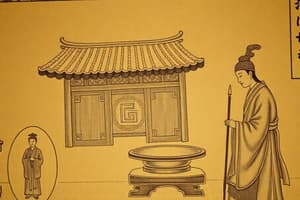Podcast
Questions and Answers
Who were the Yangban class in Korea?
Who were the Yangban class in Korea?
A literati class expected to hold public office and follow Confucian doctrine.
What characteristics defined the Yangban class?
What characteristics defined the Yangban class?
They were expected to hold public office, study, and cultivate moral standards.
Why were the Yangban important?
Why were the Yangban important?
They helped cultivate the moral standards of Joseon society.
Why were the Manchus important in Chinese history?
Why were the Manchus important in Chinese history?
What were the key elements of treaty systems imposed on China and Japan between 1840 and 1860?
What were the key elements of treaty systems imposed on China and Japan between 1840 and 1860?
What was Tokugawa Japan?
What was Tokugawa Japan?
What was the Qing Dynasty?
What was the Qing Dynasty?
What was the Joseon Dynasty?
What was the Joseon Dynasty?
What was the Opium War?
What was the Opium War?
What was the Taiping Rebellion?
What was the Taiping Rebellion?
What was Commodore Perry's visit?
What was Commodore Perry's visit?
What was the Meiji Restoration?
What was the Meiji Restoration?
What was the Self-Strengthening Movement?
What was the Self-Strengthening Movement?
What was the Satsuma Rebellion?
What was the Satsuma Rebellion?
What was the Tonghak (Donghak) Rebellion?
What was the Tonghak (Donghak) Rebellion?
What was the Sino-Japanese War?
What was the Sino-Japanese War?
What was the Boxer Uprising?
What was the Boxer Uprising?
Who was King Kojong of Korea?
Who was King Kojong of Korea?
What was the Russo-Japanese War?
What was the Russo-Japanese War?
Flashcards are hidden until you start studying
Study Notes
Yangban Class in Korea
- The Yangban class comprised the educated elite of Korea, essential for governance.
- Their role included public office, adherence to Confucian values, and promotion of moral standards in Joseon society.
- They were key to the administration and cultural development during the Joseon dynasty.
Importance of Manchus
- The Manchus established the Qing dynasty, which lasted from 1636 to 1912.
- Their rule marked the last imperial regime in Chinese history.
Treaty Systems (1840-1860)
- Treaties imposed on China and Japan often followed military defeats or threats.
- Key elements included territorial cessions, reparations, tariff autonomy loss, treaty port openings, opium legalization, and foreign extraterritorial rights.
Tokugawa Japan
- Spanned from 1603 to 1867 and was founded by Tokugawa Ieyasu.
- Represents the final era of traditional Japan before modernization.
Qing Dynasty (1644-1911)
- Characterized by Manchu leadership, significant territorial expansion, and considerable population and economic growth.
Chosŏn (Joseon) Dynasty
- Also known as Great Joseon, this dynasty lasted over 500 years, founded by Yi Seong-gye in 1392.
- Overthrew the Goryeo dynasty and was replaced by the Korean Empire in 1897.
Opium War
- Conflict between Britain and the Qing Empire, triggered by China's opposition to opium imports.
- The Treaty of Nanking resulted from Britain's victory, imposing harsh terms on China.
Taiping Rebellion
- Occurred from 1850 to 1864, prompted by the Manchu Dynasty's inability to manage the opium crisis.
- Represented a significant uprising against foreign intervention and governmental failures.
Commodore Perry's Visit
- On July 8, 1853, American Commodore Matthew Perry arrived in Tokyo Bay.
- His mission aimed to reopen trade and diplomatic relations between Japan and the West after two centuries of isolation.
Meiji Restoration
- Following the fall of the Tokugawa Shogunate in 1868, Japan undertook reforms for centralization, industrialization, and imperialism.
- Led by a cohort of young leaders advocating modernization.
Self-Strengthening Movement
- Aimed at modernizing China’s military and promoting Western investment in infrastructure during the late 19th century.
Satsuma Rebellion
- In 1877, Saigo Takamori led the last major samurai revolt against the Japanese government.
- After his failure, he died by seppuku, marking the end of the samurai as a distinct social class.
Tonghak (Donghak) Rebellion
- A peasant uprising in Korea from January 1894 to December 1895, instigated by the Donghak movement.
- Peasants opposed Western influences and sought to address socio-political injustices.
Sino-Japanese War
- Fought from 1894 to 1895, Japan pursued imperial expansion into China.
- Ended with the Treaty of Portsmouth, granting Japan trade rights, control over Manchuria, and Korea as a protectorate.
Boxer Uprising
- A secret society called the Righteous Harmonious Fists aimed to expel foreign influences from China.
- This movement emerged in response to foreign encroachments on Chinese culture and sovereignty.
King Kojong (Korea)
- Ruled Korea from 1864 to 1907, transitioning from the last king of Joseon to the first Emperor of the Korean Empire.
- Known as the Gwangmu Emperor, he faced external pressures leading to his eventual abdication.
Russo-Japanese War
- Conflict between Russia and Japan from 1904 to 1905 over imperial ambitions in Manchuria.
- Marked the first major military victory of an Asian power over a European one in modern history.
Studying That Suits You
Use AI to generate personalized quizzes and flashcards to suit your learning preferences.

